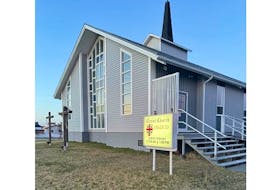ST. JOHN'S, N.L. — A member of Nalcor Energy’s project management team until late 2016, Darren Debourke says construction workers were not being flown to Muskrat Falls in 2016 only to be turned around and sent home.
But while on the stand Friday at the Muskrat Falls Inquiry, Debourke also did not dispute that accommodations on site at Muskrat Falls fell short during construction.
The Inquiry had previously heard, on May 3, from Laszlo Von Lazar and Thierry Martin, who were part of the management team for GE Grid Solutions. Lazar testified buses of labourers were turned around in 2016 at the main construction site at Muskrat Falls, due to a lack of space.
But Debourke — who was working directly with the GE Grid Solutions management — says that never happened.
“That’s not what I recall,” he said when asked about the comments.
He clarified “craft labour,” being trades workers, were expected to be housed at the site. But the camp was full, so contractors were being told to find alternative space for their management team members. He said that meant either in an apartment or a hotel in the community, or otherwise.
Emails in evidence show the serious challenge in housing workers, as a project manager for Pomerleau (working with GE) wrote to Martin on May 10, 2016.
“Presently due to the non-availability of camp accommodations and appropriate lodging in the area, (the contractor) had no other choice than to postpone the arrival of our roofing subcontractor’s second crew,” it reads, noting the crew’s assignment. “Furthermore, other critical trades such as reinforcing steel are currently lodged in hotel rooms in Happy Valley-Goose Bay but hotel rooms are no longer available starting mid-week. These workers will be demobilized from site.”
Sending workers home has a “snowball effect” on construction activity, it warned.
GE’s Martin, in turn, notified Debourke on May 18, 2016, adding GE’s people were having trouble finding a place to sleep.
“This uncertainty and overloaded facilities is hindering contractor’s efforts to add additional management resources,” Martin stated.
While there may be dispute over what Nalcor Energy was directly responsible for, as opposed to the contractor’s responsibility, it is clear there was a shortage of beds.
Apart from off-site management, trades workers were paid if they found alternate accommodations (at $116/day) and construction staff were also paid if they volunteered to double bunk on site (compensation equal to $58 per day). The rates were confirmed in May 2016 in an email to Trades NL (Resource Development Trades Council) executive director Darin King, from senior labour relations adviser David Clark.
It wasn’t the first or last trouble with accommodations.
As for snowballing, contractor IKC-ONE described its experience.
That company was one of the first on the project, doing bulk excavation at the Muskrat Falls site as part of the “early works” started in 2011, before the project was even sanctioned. Nalcor Energy issued a news release in the fall of 2012 giving public notice the digging was proceeding, saying “time is of the essence.” The political debate continued, but the Crown corporation didn’t want to fall behind schedule.
“Let’s start the engines!” read a Nov. 1, 2012, internal email from Leonard Knox to individuals on the contractor team, following word of the award. There was enthusiastic response.
IKC-ONE ultimately clocked a 104-day delay in worker accommodations on site, as per its contract, according to a company-written summary now in evidence at the inquiry.
The company started to buy as much space in hotels and apartments around Happy Valley-Goose Bay as possible, placing people all around the town in late 2012. It meant additional pickups and a van were purchased to shuttle workers around the community. The company hired a full-time property manager and added administrative hours.
And since the private hotels and apartments still didn’t offer enough space, the company had to turn to the Government of Canada, requesting beds in the military barracks at the adjacent air base. At first, it didn’t have much success in securing rooms for January 2013, being told in December 2012 that kind of request could take 12 to 14 weeks to process. But approval and space were later granted.
A bus to get workers into and out of the site was purchased and a driver hired. The bus would travel on public roads before getting to a long site access road, so it required new paint and seatbelts to meet provincial regulations. Company mechanics started at 5 a.m. to assure the bus was ready.
The company claimed it had planned and budgeted for a six-kilometre shuttle from expected on-site accommodations to the work area, but instead had to drive back and forth over a 56-kilometre route, for every shift from Nov. 9, 2012 to April 15, 2013. In this case, that was roughly an hour and 30 minutes one way (due to the state of the still-rough road), versus a planned 15 minutes.
The access route was described as “incomplete, substandard and problematic.”
“The cumulative impact of over three months of traveling in these conditions had a material effect on logistics, supervision, workforce fatigue, and morale and resulted in lost productivity,” IKC-ONE stated in an August 2013 summary of its complaints, noting changes were then made to the rotation schedule to try to reduce worker fatigue and improve productivity.
IKC-ONE put further complaints on record, including problems at times with site access, a delay in preparing an area for the company’s on-site project office, deficiencies in on-site telecommunications and saturated soil that didn’t match geotechnical conditions reported.
It claimed the job could have been finished without delay if the contractor’s starting environment had been as expected.
RELATED









